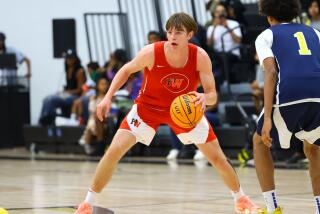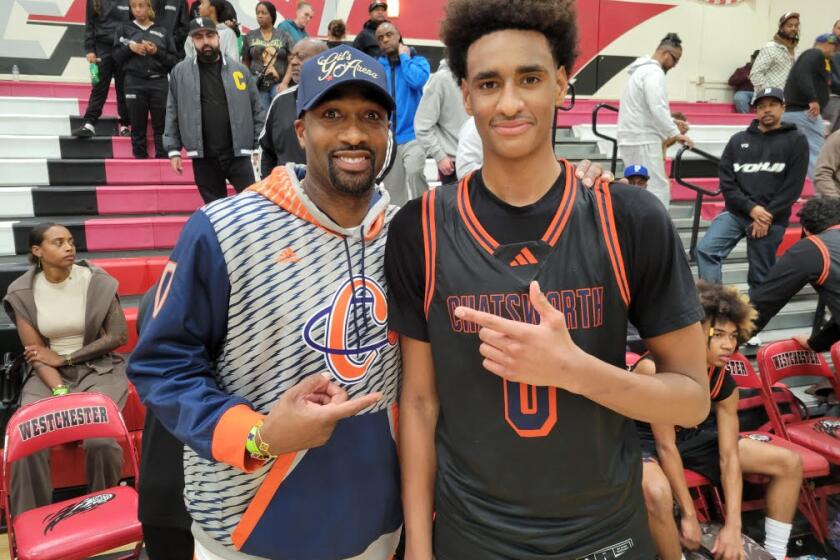Basketball Snobbery : All You Need to Play in This League Is $20.00 and Enough Talent to Compete With Some of the Best College Cagers in the Nation
The way Jerry Weber sees it, elitism is a necessary evil in summer league college basketball.
Weber, founder and director of the Southern California College Open Basketball League, accepts only the area’s best college-eligible athletes to play run-and-gun basketball from mid-June through mid-August at Morningside High in Inglewood.
“It’s snobbery,” said Weber, who has been involved in community basketball for 20 years, “but if the players aren’t good enough they don’t get in.”
Twenty dollars is all a player needs to try out for Weber’s 12-team league sanctioned by the NCAA. To play he needs enough talent to compete with some of the nation’s best Division 1-A cagers.
Now in its fourth year, the SCCO includes UCLA sophomore center Greg Foster, Loyola senior guard Corey Gaines, USC freshman guard Anthony Pendleton and Pepperdine sophomore forward Tom Lewis. Lesser known players with comparable talents represent smaller Los Angeles schools and eastern colleges. According to NCAA rules, all players must live or play basketball for an institution within 100 miles of the league site.
Peek through the doors at Morningside’s gym on any Tuesday or Thursday night, Saturday or Sunday afternoon and you’ll see a variety of slams, jams and whirling-dervish drives to the basket. It’s Showtime on a small scale.
“There’s not much structure to the games,” said the 6-foot-7 Lewis, who transferred to Pepperdine from USC last season. “It’s kind of like pickup games. Whoever gets the ball shoots most of the time.
“It’s probably more fun the way we play, but it’d probably help us more if we played a more structured game because no college coach would let their players roam free like they’re doing here.”
Instead, college coaches come to Morningside to observe the fast, above-the-rim game. Recently USC Coach George Raveling, Washington Coach Andy Russo and Loyola Coach Paul Westhead reclined on the bleachers for a Thursday night match-up between Molten America, featuring Loyola brothers Mike and Stephen Yoest, and Say No, a team with six USC players.
Weber said the Ravelings, Russos and Westheads like to evaluate their players. But the players’ performances have to be taken with a grain of salt because the SCCO uses NBA rules not found in college play, such as the 24-second shot clock and mandatory man-to-man defense. The absent zone defense opens the larger key for big-man gymnastics. And the shot clock?
“I don’t think the clock has gone off at all, except maybe once,” said Foster.
The up-and-down game makes the shot clock unnoticeable, as 48-minute contests consistently reach scores of 100 or more. Set offense is a rarity. Spectacular offense is the norm.
The tallest players muscle for position and rebound while the guards blaze down court. The 6-10 Foster, who blocked 24 shots in 31 games last year at UCLA, plays to stay in shape and works on fundamentals if he gets the chance.
“People come out to slam the ball, run and excite the crowd, even though those are the wrong reasons to be out here,” he said. “Everybody should be working on skills, but everybody comes out here to jive around, show off and have fun.”
Except Weber. He runs the league because he wants to give talented athletes a chance to be noticed, and he enjoys the friendly atmosphere his league generates.
His objectives may be refreshing. But Weber, clad in jacket and tie as he attends games six days a week, three devoted to his NBA Pro-Am league, often looks weary from managing logistics and keeping 18-hour days.
Money doesn’t rouse him. He is president of SCE TV, a sports television company, but says that offers few returns. The SCCO needs $18,000 to function, and he said breaking even is difficult. No problem, though.
“I’ve never taken a penny out (of my leagues) and I don’t want to. I do it because it’s not a business. I love basketball and working with kids.”
The NCAA prohibits outside college leagues from charging admission, making the SCCO a bargain for the basketball junkie. Weber, an addict himself, follows NCAA rules religiously and believes his league is perhaps the best in the nation. His is a humble elitism.
“I charge a one-time, $20 tryout fee. That’s the equalizer,” he said. “That’s why I get all the talent because some of these guys couldn’t play summer ball if they had to pay.”
Three or four SCCO teams do pay $1,000 to play, forcing each player to lay out $100 unless the team is sponsored. These teams bypass a six-hour draft because their coaches have already determined who they want. The players don’t mind paying, according to Orange County Coach Pat Barrett, since the money assures them playing time other teams cannot offer due to larger rosters.
Barrett, Lewis’ legal guardian and former assistant coach at Mater Dei High, has courted a team of Orange County players since 1985, many of whom played together in high school. Lewis, a Mater Dei product, and Syracuse sophomore guard Steve Thompson, from Crenshaw High, play for Barrett, whose club finished first in SCCO league play in 1985.
“Each player plays for a different reason,” said Barrett. “My team plays to get better for next year, and we play a more disciplined style. No college coach in the country is going to let their kids play like they do here, up and down.
“Sometimes it gets a little ragged, but with the quality players, it’s very competitive.”
Barrett said his team never practices. The teams that try to practice, like Foster’s General Pipe, aren’t necessarily successful.
“We’ve been trying to get practices together but no one’s been showing up,” said Foster. “I’ve shown up, but it’s a run-and-gun league so people think, ‘Why practice?’ because once you get out on the court you’re not gonna do any of the stuff we practiced anyway.”
What the athletes do is play lightning fast ball with the best, courtesy of Weber, who developed the SCCO out of a small men’s league at Van Ness Recreation Center.
In 1981, when the NBA was looking to establish a Pro-Am (professional-amateur) system to train prospective NBA officials, it sent representatives to many cities, including Los Angeles, to pick an ongoing activity. At the time Weber was running a league under the aegis of the AAU Southern Pacific Assn. The NBA chose his activity.
Weber combined college and pro players in one pro-am league until the NCAA became concerned about student-athletes receiving funding from the NBA or its affiliated sponsors, prohibited since the NCAA was founded. So Weber formed the SCCO, which has been growing since.
Only NCAA violations could stunt that growth, something Weber and operations manager Jim Bertolero make sure to avoid.
Bertolero, 48, a self-professed “jack of all trades and master of none,” helps Weber run the NBA pro-am and the SCCO by supervising referees, handling finances, scheduling games and even washing uniforms. He is adamant about avoiding what the NCAA would declare dirty laundry.
“If anybody even thinks there is money from the NBA going into the (SCCO), then the players are classified as pros, and that is taboo,” he said. “So I have to keep everything separate. I have to have a bank account for the pros and a bank account for the college league.”
The SCCO account never swells, Bertolero said, because everything is self-supported, unlike other profit-making leagues around the country that require large entry fees.
Additional funding may come this summer through government grants, Weber said, as the SCCO teams with the South Los Angeles Development Committee in a community joint venture. The committee will also counsel any SCCO player about the pressures of college.
Part of such counseling concerns drugs and the difficulty of getting admitted to college or receiving a scholarship. Weber believes he can improve a player’s chances of getting a scholarship by giving him playing exposure.
“Some players who were on good high school teams never played and never had a chance at a scholarship because nobody saw them play,” he said.
“You have to give them a chance. Whether it does them any good is something else, but at least they get the chance.”
For Weber and his associates, those chances are expensive. But enough idealism goes a long way.
“I don’t really care if (the players) appreciate it or not,” Weber said. “They figure they’ve got it coming anyway. If they’re around long enough, they think getting things cheap is the way it is. That’s not the way it is, but I don’t expect a thank you.
“I’m doing this primarily because I think it’s the right thing to do and I enjoy doing it.”
Weber’s league, however, is not simply a welfare or counseling service open to anybody. A prospective player must prove himself in tryouts, which is not easy. One year Boston Celtics-designated three-point shooter Connor Henry, who played at Claremont High and UC Santa Barbara, “couldn’t get in the league because he was dogging it in tryouts,” Weber said.
“We rate the guys on a 0-10 scale in several areas and he thought he was just going to walk in.”
Henry eventually made the cut after hustling in the final tryout, but normally at least 200 athletes get shut out.
“Not always the best player is going to make it,” Bertolero said.
Those who do still make errors, but that’s OK, according to Foster.
“It’s totally different from the college game,” he said. “Out here it’s all right to make a few mistakes. In a college game, if you breathe wrong you’re coming out.”
But coaches do make substitutions in SCCO games, particularly those who are fierce competitors.
“Some really want to win, so if a guy is not doing something right, they’ll sit him down,” Bertolero said. “They want to win that satin jacket (the championship award) at the end and have the bragging rights.”
Boasting is also common in the SCCO, as many players experiment with myriad in-your-face moves and lesser-known players try to show up the stars.
Foster said some players gun for him because of his name, size and importance to his team, but, he said, the attention just makes him play better.
And, said Weber, the quality of play gets better each year, thanks to elite players like Foster and Lewis. But the snobbery fades when it’s time to play ball.
“I definitely feel there are some players that are here just to be here, not because they’re great players or anything,” said Foster. “But I’m not really too stuck-up when it comes to playing basketball. Anybody who wants to play can play, that’s how I am.”
More to Read
Get our high school sports newsletter
Prep Rally is devoted to the SoCal high school sports experience, bringing you scores, stories and a behind-the-scenes look at what makes prep sports so popular.
You may occasionally receive promotional content from the Los Angeles Times.






